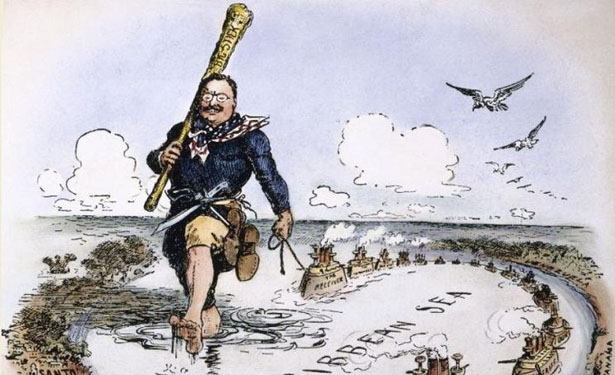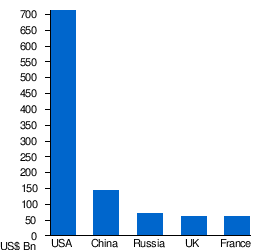What Does Teddy Roosevelt's 'Big Stick' Line Really Mean, Anyway?
Romney's misuse of the famous proverb should set off warning bells.
Romney's misuse of the famous proverb should set off warning bells.

The overall meaning behind Romney's metaphorical critique was clear: under Obama, America grew weaker, while under Romney, America would be powerful again. There's just one problem with Romney's analogy. Teddy Roosevelt's dictum didn't mean what Romney seems to think it does.
Romney's argument is that increasing American power -- making the stick bigger -- requires the United States to control what happens around the world. When it fails to do that, America's stick shrinks.
Romney has made comments to this effect on more than one occasion. Speaking to an audience in Virginia, Romney recently lamented: "Sometimes it seems that we're at the mercy of events instead of shaping events." While addressing the Veterans of Foreign Wars, Romney declared, "If we do not have the strength or vision to lead, then other powers will take our place." Romney suggested to donors at the secretly taped fundraiser that if he were commander-in-chief, he would have left 10,000-20,000 U.S. troops in Iraq rather than withdraw them all. And just last month, Romney told CBS News he'd consider sending troops to Syria. In Romney's view, it's this kind of aggressive use of American power that makes America's stick big.
Observers have pointed out that Romney's foreign policy actually resembles Obama's in many respects. Both men see the United States leading the world. But rather than get bogged down in speculation over what either man would do in various global hotspots, suffice it to say that the animating idea behind Romney's worldview differs from Obama's in that it requires a kind of activism the latter -- who was described by an anonymous "adviser" during the Arab Spring as "leading from behind" -- has been more reticent to show.
 The world's top five military spenders in 2011 (Wikimedia Commons)
The world's top five military spenders in 2011 (Wikimedia Commons)What does this have to do with Romney's use of metaphor? Just this: No matter who's in charge, America has been and in four years will still be the most powerful nation on the planet -- the country with the biggest, pointiest stick. Compared to other countries, its size is gigantic, and it's been that way ever since World War II. How each president has chosen to wield that power has taken shape in different ways, but to talk about that exceeds the scope of the big-stick analogy. The fact is, even accounting for Romney's proposed $7.9 trillion addition to the defense budget that aims to make America's stick bigger in absolute terms, there's very little the two men are likely to do themselves to change the United States' power position relative to everyone else. From George W. Bush on down to Harry Truman, it's basically been the same stick the whole time.
For Romney's sentiment to make sense within the bounds of Roosevelt's analogy, his message would have to look something like this: America is powerful only when its stick is in motion, thwacking away at some international problem spot. Allowing the stick to rest leaves the United States emasculated and vulnerable. But, of course, Roosevelt never said anything about swinging the stick.Despite the popular image of Roosevelt as a swashbuckling uber-American, his words have, over time, been cast and recast incorrectly as an endorsement of bellicosity. In fact, the president who stormed Kettle Hill as a younger man generally preferred letting the military's mere existence speak for itself. Historian Edmund Morris writes that the night Roosevelt first gave his big-stick speech, the then-vice president's words were rather misconstrued:
This generated such loud applause as to suggest the audience took his 'adage' as aggressive, rather than cautionary. Actually, Roosevelt was trying to say that soft-spoken (even secret) diplomacy should be the priority of a civilization, as long as hardness -- of moral resolve, of military might -- lay back of it.
Roosevelt's understated approach was apparent even in one of the highest-profile military deployments of his career. In 1907, the president dispatched a gigantic armada to circumnavigate the globe. The voyage of over a dozen steel battleships came to be known as the Great White Fleet, and part of the point was to demonstrate Washington's global naval capacity without firing a shot. Today, American ships roam the globe as a matter of course. Nobody needs convincing of America's military might, although the appearance of a destroyer or two, like the ones Obama dispatched to Libya immediately following the consulate attack, serves an effective reminder.
This isn't just an academic exercise: Analogies are a common political decision-making tool, and failing to apply them correctly -- or learning the wrong lessons from them -- can lead to serious blunders.